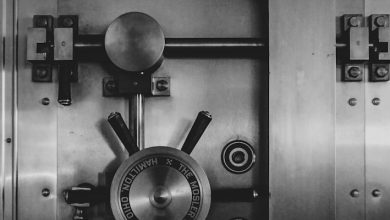A Beginner’s Guide to Cryptocurrency Wallets

- Understanding the Basics of Cryptocurrency Wallets
- Types of Cryptocurrency Wallets Explained
- Security Measures to Protect Your Digital Assets
- How to Choose the Right Cryptocurrency Wallet for You
- Setting Up Your First Cryptocurrency Wallet
- Tips for Safely Storing and Managing Your Cryptocurrency
Understanding the Basics of Cryptocurrency Wallets
Cryptocurrency wallets are digital tools that allow individuals to securely store, send, and receive their cryptocurrencies. Understanding the basics of cryptocurrency wallets is essential for anyone looking to enter the world of digital assets.
There are several types of cryptocurrency wallets available, each with its own unique features and security measures. Some of the most common types include hardware wallets, software wallets, and paper wallets.
Hardware wallets are physical devices that store a user’s private keys offline, making them less vulnerable to hacking or cyber attacks. Software wallets, on the other hand, are digital applications or programs that can be accessed via desktop, mobile, or web browsers.
Paper wallets are physical documents that contain a user’s public and private keys, typically generated using a software wallet. While paper wallets are considered one of the most secure options for storing cryptocurrencies, they can be easily lost or damaged.
When choosing a cryptocurrency wallet, it is important to consider factors such as security, convenience, and ease of use. It is recommended to use a combination of different types of wallets to diversify risk and ensure the safety of your digital assets.
Types of Cryptocurrency Wallets Explained
Cryptocurrency wallets come in various types, each with its own unique features and benefits. The most common types include hardware wallets, software wallets, and paper wallets.
Hardware wallets are physical devices that store your cryptocurrency offline, providing an extra layer of security against hacking and theft. These wallets are considered one of the safest options for storing your digital assets.
Software wallets, on the other hand, are digital applications that can be accessed on your computer or mobile device. While convenient, software wallets are more vulnerable to cyber attacks compared to hardware wallets.
Paper wallets are a form of cold storage where you print out your public and private keys on a piece of paper. This method is secure as long as you store the paper in a safe place, away from potential threats.
Each type of wallet has its own advantages and disadvantages, so it’s essential to choose the one that best suits your needs and preferences. Whether you prioritize security, convenience, or accessibility, there is a cryptocurrency wallet out there that is perfect for you.
Security Measures to Protect Your Digital Assets
When it comes to safeguarding your digital assets, security measures are crucial to protect your cryptocurrency wallets from unauthorized access. Implementing strong security practices can help prevent theft and hacking attempts, ensuring that your investments remain safe and secure.
One of the most important security measures to consider is using a secure and reputable cryptocurrency wallet. Look for wallets that offer features such as two-factor authentication, encryption, and secure backups. These features can help enhance the security of your wallet and make it more difficult for hackers to gain access to your funds.
Another important security measure is to keep your private keys secure. Your private keys are essentially the passwords that allow you to access your cryptocurrency wallet, so it’s crucial to keep them safe and confidential. Avoid sharing your private keys with anyone and consider storing them offline in a secure location.
Regularly updating your wallet software is also essential for maintaining security. Developers often release updates to fix security vulnerabilities and improve performance, so it’s important to stay up to date with the latest versions of your wallet software. By keeping your wallet software updated, you can help protect your funds from potential security threats.
Lastly, be cautious of phishing attempts and scams that may try to trick you into revealing your private keys or other sensitive information. Be wary of unsolicited emails or messages asking for personal information and always double-check the legitimacy of any requests for sensitive data. By staying vigilant and practicing good security habits, you can help safeguard your digital assets and protect your cryptocurrency investments.
How to Choose the Right Cryptocurrency Wallet for You
When selecting a cryptocurrency wallet, it is essential to consider various factors to ensure you are choosing the right one for your needs. There are several types of cryptocurrency wallets available, including hardware wallets, software wallets, and online wallets. Each type has its advantages and disadvantages, so it is crucial to weigh these carefully before making a decision.
One important factor to consider when choosing a cryptocurrency wallet is security. Hardware wallets are generally considered the most secure option since they store your private keys offline, making them less vulnerable to hacking. Software wallets, on the other hand, are connected to the internet, making them more susceptible to cyber attacks. Online wallets are also connected to the internet, making them the least secure option.
Another factor to consider when choosing a cryptocurrency wallet is convenience. Hardware wallets are typically less convenient to use since they require you to carry a physical device with you. Software wallets, on the other hand, are more convenient since you can access them from any device with an internet connection. Online wallets are also convenient to use since you can access them from anywhere, but they are the least secure option.
When choosing a cryptocurrency wallet, it is also essential to consider the cost. Hardware wallets are the most expensive option since they require you to purchase a physical device. Software wallets are usually free to download and use, but some may charge fees for certain features. Online wallets are also typically free to use, but some may charge fees for transactions.
In conclusion, when choosing a cryptocurrency wallet, it is crucial to consider factors such as security, convenience, and cost. By weighing these factors carefully, you can select the right wallet for your needs and ensure that your cryptocurrencies are safe and secure.
Setting Up Your First Cryptocurrency Wallet
To **set up** your **first** **cryptocurrency** **wallet**, you will **need** to follow a **few** simple steps. First, you **must** **choose** a **reputable** **wallet** provider. Look for **one** that offers **strong** security measures and has a good **reputation** in the **industry**. Once you **have** **selected** a **wallet**, you can **begin** the **process** of creating your **account**.
Next, you will **need** to **generate** a **unique** **public** and **private** **key** pair for your **wallet**. **This** is **essential** for **securing** your **funds** and **ensuring** that only you can access them. Be sure to **keep** your **private** **key** **safe** and **secure**, as **losing** it **could** **result** in the **loss** of your **cryptocurrency**.
Once you **have** **created** your **keys**, you can **start** **receiving** and **sending** **cryptocurrency**. To **receive** **funds**, **simply** **share** your **public** **key** with the **sender**. To **send** **funds**, you will **need** to **enter** the **recipient’s** **public** **key** and the **amount** you wish to **send**. Be **sure** to **double** **check** all **information** before **confirming** the **transaction**.
In **conclusion**, **setting** up your **first** **cryptocurrency** **wallet** is a **relatively** **simple** **process** that **can** **be** **done** in just a **few** **easy** **steps**. By **choosing** a **reputable** **provider**, **creating** **secure** **keys**, and **practicing** **safe** **transaction** **practices**, you **can** **begin** **using** **cryptocurrency** with **confidence** and **peace** of **mind**.
Tips for Safely Storing and Managing Your Cryptocurrency
When it comes to storing and managing your cryptocurrency, security should be your top priority. Here are some tips to help you keep your digital assets safe:
- Use a hardware wallet to store your cryptocurrency offline, away from potential hackers.
- Enable two-factor authentication on all of your accounts for an extra layer of security.
- Backup your wallet’s private keys in multiple secure locations to prevent loss in case of hardware failure.
- Avoid storing large amounts of cryptocurrency on exchanges, as they are more vulnerable to hacking.
- Regularly update your wallet software to protect against any potential security vulnerabilities.
By following these tips, you can help ensure that your cryptocurrency investments remain safe and secure.



